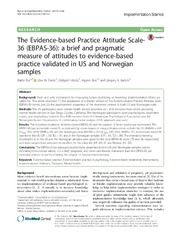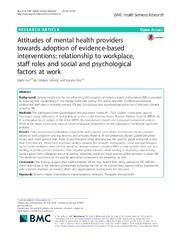| dc.contributor.advisor | Skre, Ingunn | |
| dc.contributor.author | Rye, Marte | |
| dc.date.accessioned | 2019-06-17T10:36:39Z | |
| dc.date.available | 2019-06-17T10:36:39Z | |
| dc.date.issued | 2019-06-20 | |
| dc.description.abstract | The complicated relationship between clinical health science and clinical practice has widely been referred to as the “science-practice gap”. This is for instance visible in the discrepancy between the amount of resources spent to develop and apply evidence-based treatment programmes and interventions (EBI) and the extent to which these interventions are used in real-life mental health care service settings. This is a major impetus for the field of implementation science, which strives for a deeper understanding of factors and strategies that determine the success or failure of implementation in health care organisations. This thesis explores factors that might influence the implementation of EBI in routine mental health care, including the specific intervention of routine outcome monitoring and feedback (ROM). The thesis has a special focus on mental health professionals’ attitudes toward adopting EBI, measurement issues as well as the relationship between attitudes and organizational factors. Data were collected through two different online survey studies in which members of the Norwegian Psychological Association and the Norwegian Nurses Organization, professional group for nurses working in mental health and substance abuse, were invited to participate. Papers I and III provides implementation instruments that could be used both for research and applied purposes. Paper II explore individual and organizational predictors of professionals’ attitudes towards adopting EBI. Paper III aim at gaining insight into professionals’ attitudes that might influence the adoption of ROM, through exploring how attitudinal domains relate to clinicians use of standardized instruments for treatment planning and evaluation. Major results and implications of these studies include the need to consider that professionals exhibit different levels of experience, perspectives and needs, which again may have implications for the choice and design of training efforts and organizational support that will most efficiently lead to successful adoption and sustainability of an implementation initiative. | en_US |
| dc.description.doctoraltype | ph.d. | en_US |
| dc.description.popularabstract | There is a major gap between the amount of resources spent to develop evidence-based treatment programmes and interventions (EBI) in mental health care and the extent to which these interventions are used in real-life mental health care services. Embedded in the field of implementation science and through two online survey studies, this thesis explore factors that might influence the implementation of EBI in mental health care, including the use of routine outcome measures to get feedback on patient progress during treatment. The thesis has a special focus on mental health professionals’ attitudes toward adopting EBI, the relationship between attitudes and organizational factors, and the development of implementation instruments. Results and implications discussed concern professionals different levels of experience, perspectives and needs with regard to adopting an implementation initiative and its implications for the choice and design of training efforts and organizational support | en_US |
| dc.description.sponsorship | The publication charges for paper 1 and paper 2 in the thesis have been funded by grants from the publication fund of UiT The Arctic University of Norway | en_US |
| dc.description | Nesten ferdig. Venter på samtykke fra medofrfattere. 20190614 NC | en_US |
| dc.identifier.uri | https://hdl.handle.net/10037/15564 | |
| dc.language.iso | eng | en_US |
| dc.publisher | UiT The Arctic University of Norway | en_US |
| dc.publisher | UiT Norges arktiske universitet | en_US |
| dc.relation.haspart | <p>Paper I: Rye, M., Torres, E.M., Friborg, O., Skre, I. & Aarons, G.A. (2017). The Evidence-based Practice Attitude Scale- 36 (EBPAS-36): a brief and pragmatic measure of attitudes to evidence-based practice validated in US and Norwegian samples. <i>Implementation Science, 12</i>, 44. Also available at <a href=https://hdl.handle.net/10037/11259>https://hdl.handle.net/10037/11259</a>.
<p>Paper II: Rye, M., Friborg, O. & Skre, I. (2019). Attitudes of mental health providers towards adoption of evidence-based interventions: relationship to workplace, staff roles and social and psychological factors at work. <i>BMC Health Services Research, 19</i>, 110. Also available at <a href=https://hdl.handle.net/10037/15561>https://hdl.handle.net/10037/15561</a>.
<p>Paper III: Rye, M., Rognmo, K., Aarons, G.A. & Skre, I. Attitudes to the use of routine outcome monitoring of psychological therapies among mental health providers: The EBPAS-ROM. (Submitted manuscript). | en_US |
| dc.rights.accessRights | openAccess | en_US |
| dc.rights.holder | Copyright 2019 The Author(s) | |
| dc.rights.uri | https://creativecommons.org/licenses/by-nc-sa/3.0 | en_US |
| dc.rights | Attribution-NonCommercial-ShareAlike 3.0 Unported (CC BY-NC-SA 3.0) | en_US |
| dc.subject | Evidence-based practice | en_US |
| dc.subject | Evidence-based interventions | en_US |
| dc.subject | Implementaion | en_US |
| dc.subject | Attitudes | en_US |
| dc.subject | Mental health | en_US |
| dc.subject | Routine outcome monitoring | en_US |
| dc.subject | Feedback | en_US |
| dc.title | Attitudes to evidence-based interventions and routine outcome measures in mental health professionals | en_US |
| dc.type | Doctoral thesis | en_US |
| dc.type | Doktorgradsavhandling | en_US |


 English
English norsk
norsk



